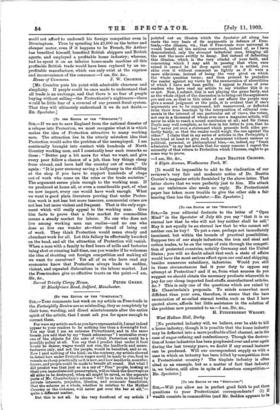(To THE EDITOR Or THE "SPEOTATOR.1
SIR,—Your comments last week on my article on Free-trade in the Fortnightly Review are so misleading, they so completely by
their tone, wording, and direct misstatements alter the entire spirit of the article, that I must ask you for space enough to correct them.
For were my article such as you have represented it, I must indeed appear to your readers to be nothing less than a downright fool. You say that I am an extreme Protectionist, and in the same breath you add that by my "frank admissions" I neutralise every one of the objects for the sake of which Protection could be a possible policy at all. You say that I predict that under it food would be dearer, wages would not rise, the landlords and manu- facturers only, and not the people, would be benefited, and so on. Now I said nothing of the kind; on the contrary, my article showed in detail how under Protection wages could be made to rise, food to remain as cheap practically as it is now, and how landlords, manufac- turers, and people could be made to benefit all round. But what I did predict was that just as in a cry of "Fire" people, looking at their own immediate self-preservation, will so block the doorways as all alike to be destroyed, when all might be saved, so the separate parts of Mr. Chamberlain's scheme " will be in turn so blocked by private interests, prejudice, illusion, and economic fanaticism, that the scheme as a whole, whether in relation to the Mother' Country or the Colonies, will never get over the bar at all,"— quite a different matter.
But this is not all. In the very forefront of my article I pointed out an illusion 'which the Spectator all along has made the very basis of its arguments in defence of Free- trade the illusion, viz., that if Free-trade were universal it would benefit at/ the nations concerned, instead of, as I have demonstrated, only the strongest industrial ones, bringing all the rest the more swiftly to decay. But instead of defending this illusion, which is the very citadel of your faith, and concerning which I may add in passing that when once raised it cannot be let drop again until it is settled, you skim over it without comment as lightly as if it were a mere side-issue, instead of being the very pivot on which the whole question turns ; and then proceed to prejudice the reader against my views by the enumeration of absurdities of which I have not been guilty. I appeal to those of your readers who have read my article to say whether this is so or not. Now, I submit, this is not playing the game fairly, and as the whole object of the discussion is to bring out the arguments pro and con. so that in this crisis of our affairs the people may give a sound judgment at the polls, it is evident that if one's arguments are to be suppressed, left unanswered, or deflected from their true bearings by the interposition of editorial com- ments in the interest of one particular set of views, the voters, not one in a thousand of whom ever sees a magazine article, will never be able to reach a sound conclusion at all; and Sir Conan Doyle may well complain, as he does in his letter to you, that he has " never yet seen a statement which presents both sides per- fectly fairly, so that the reader could weigh the one against the other." I claim that in my series of articles in the Fortnightly I have tried at least to give such a statement without animus or political, personal, or philosophical bias,—as, indeed, my "frank admission " in my last article that for many reasons I regret the necessity of that return to Protection which I foresee, ought to go some way to prove.
9 Elgin Avenue, Westbourne Park, W.
[It would be impossible to add to the vindication of our reviewer's very fair and moderate notice of Dr. Beattie Crozier's magazine article furnished by the above letter. That letter shows that we were perfectly just to him. His attack
on our unfairness also needs no reply. No Protectionist paper has taken more trouble to give the other side a fair hearing than has the Spectator.—En. Spectator.]






































 Previous page
Previous page